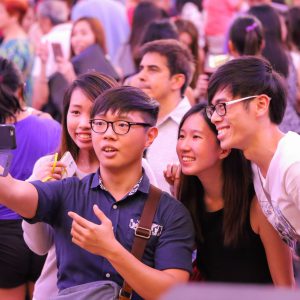Filling gaps or code choice – Code-switching across generations in colloquial Singapore Mandarin
March 7, 2022

The Speak Good English Movement (SGEM) was launched by then-Prime Minister Goh Chok Tong on 29 April 2000, in order to promote a better level of communication between all Singaporeans whose first language might not otherwise have been English. A grammatically correct English that could be universally understood, shifting away from the Mandarin-, Malay-, or Tamil- inspired neologisms and manners of speech, at least within public and multicultural spaces, was the intended aim of the Government’s initiative.
Associate Professor Cher Leng Lee (NUS Department of Chinese Studies) examines the code-switching phenomenon amongst the younger generation of Singaporean Mandarin speakers in ‘Filling gaps or code choice – Code-switching across generations in colloquial Singapore Mandarin’ (Global Chinese, 2019).
She addresses the following research questions:
(1) What code-switch elements are present within colloquial Mandarin?
(2) How is code-switching different across the three generations of grandparents, parents and young people?
(3) What are the motivations behind the code-switching phenomenon?
A/P Lee shares the perhaps surprising fact that in 1965 ‘virtually no ethnic Chinese in Singapore spoke Mandarin’ as their first language, which reveals the relatively contemporary nature of Mandarin’s status as a major language spoken in Singapore. Subsequently, with the 1987 Education Act that introduced English as the compulsory language of instruction in all schools, successive generations of Chinese-Singaporeans have developed into English-dominant bilinguals.
The study group consisted of over 300 undergraduate students from NUS, with interviews and questionnaires conducted on language usage in the areas of education, food and drink, travel, technology, social life and family. The results revealed that university students often code-switched with English when speaking with both their peers and parents, but encountered significant difficulties when communicating with older generations of Singaporeans such as their grandparents. Moreover, A/P Lee notes how many below the age of 50 were not fully confident in expressing themselves solely in Mandarin, and that an increasingly common scenario was to find Singapore Mandarin spoken with English and various dialect words in place of the unknown Mandarin one.
The article reflects on the necessity of English as the main working language in Singapore’s globalized society. However, Singaporeans, both young and old, lament the communication breakdown resulting from the loss of competency in all Chinese dialects, including Mandarin.
Read the full article here.
